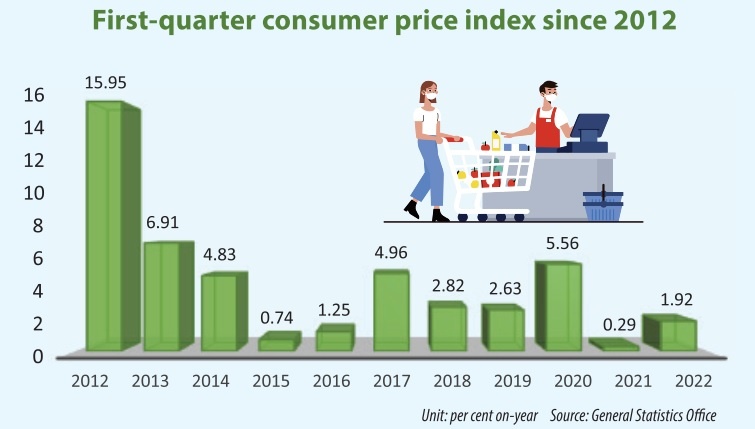Rent and fuel rises being blamed for increases to CPI
 |
| Rent and fuel rises being blamed for increases to CPI |
Returning to Hanoi after the Lunar New Year holiday, Nguyen Toan Thang and his wife were surprised at a hefty rise in the rent of his boarding house. The couple is working for Japanese-backed FCC Vietnam Co., Ltd. at Thang Long Industrial Park, about 15km from the city centre.
“Nearly 1,000 workers at the company are staying in boarding houses in Dong Anh district and Xuan Dinh quarter nearby, and many of them said that the rental has climbed by at least 20 per cent against 2021,” Thang said. “Previously our rental was about $52 per month, now it has increased to $65, excluding additional living costs paid due to escalating prices in the market.”
FCC Vietnam manufactures vehicle clutches and other automobile spare parts for Yamaha, Suzuki, and Honda, as well as partners in the US market.
Elsewhere Nguyen Viet Thang, a representative from Garment Materials Production JSC in Hanoi, told VIR that his company is employing nearly 1,000 workers and many of them are from other localities, so they have to rent houses for living near the company.
“We have the policy to assist each worker with $8.7 for this cost monthly. However, since early this year, the support has increased to $13 due to a rise in rental fees,” Thang said. “This has helped our company ensure production, with revenues in Q1 increasing 8 per cent on-year and export markets expanded to Indonesia, India, Malaysia, and Pakistan, in addition to the domestic market.”
According to the General Statistics Office, the rises in housing rentals, coupled with big hikes in prices of fuel and gas as well as indispensable items in the market, are the main factors causing an on-year increase of 2.41 per cent in the consumer price index (CPI) for March and 1.92 per cent for the first quarter of this year.
By late last week, the global average price of Brent crude oil and WITI crude oil hovered at $102 and $108 per barrel, respectively. The global price of natural gas also was $5.4 per MMBtu, according to Oilprice.com.
After seven consecutive hikes in petrol prices already this year, the price did dip slightly towards the end of March.
“On average in Q1, the price of petrol in the local market has soared by 48.81 per cent on-year, making CPI increase by 1.6 per cent,” said Nguyen Thi Huong, general director of the GSO.
Three weeks ago in Hanoi, the retail price of gas from Petrolimex for March inclusive of VAT was $22 for a tank of 12kg, up by $1.92; and nearly $87 for a tank of 48kg, up by almost $8, as compared to February.
“The gas price in Vietnam is fluctuating under global pressures. On average, it expanded 21 per cent in Q1 in the domestic market, leading to a 0.31 per cent rise in the CPI,” Huong said. “The high rise in prices of gas has pressurised consumers and many economic sectors involving production and services, while also leading to high prices of products, and the ultimate sufferers are consumers.”
Nguyen Manh Tham, a senior expert of ceramics in Hanoi’s popular Bat Trang ceramic village, said that over 1,000 households in the area are using gas to bake their products.
“On average, each household spends $1,000 a month on their work. Thus, the total money spent by the whole village on baking products is estimated to be as much as $1.1 million a month,” Tham told VIR.
With a view to reining in inflation and reducing petrol prices, the National Assembly Standing Committee on March 23 adopted a resolution to cut environmental protection tax rates on petroleum, oil and lubricants, which will take effect from April 1 to the end of the year.
However, if global prices continue escalating, said Huong of the GSO, Vietnam may have to find additional solutions to keep inflation, because the environmental protection tax rate is fixed, while the CPI fluctuates.
Huong warned that there is the pressure of high inflation this year due to the rising prices of materials in the global market in the context of the Russia-Ukraine conflict disrupting supply chains, and especially fuel supply chains.
“In addition, the country’s growth supporting packages will help create higher economic growth over the next quarters, meaning higher demands for goods and services and then higher prices,” said Huong.
“Thus, the government needs to take great caution in its price monitoring so that the country’s CPI target of about 4 per cent can be controlled.”
What the stars mean:
★ Poor ★ ★ Promising ★★★ Good ★★★★ Very good ★★★★★ Exceptional
 Tag:
Tag:
Related Contents
Latest News
More News
- Congratulations from VFF Central Committee's int’l partners to 14th National Party Congress (January 25, 2026 | 09:46)
- List of newly-elected members of 14th Political Bureau announced (January 23, 2026 | 16:27)
- 14th Party Central Committee unanimously elects To Lam as General Secretary (January 23, 2026 | 16:22)
- List of members of 14th Party Central Committee announced (January 23, 2026 | 09:12)
- Highlights of fourth working day of 14th National Party Congress (January 23, 2026 | 09:06)
- Press provides timely, accurate coverage of 14th National Party Congress (January 22, 2026 | 09:49)
- Press release on second working day of 14th National Party Congress (January 22, 2026 | 09:19)
- Minister sets out key directions to promote intrinsic strength of Vietnamese culture (January 22, 2026 | 09:16)
- 14th National Party Congress: Renewed momentum for OVs to contribute to homeland (January 21, 2026 | 09:49)
- Party Congress building momentum for a new era of national growth (January 20, 2026 | 15:00)





















 Mobile Version
Mobile Version